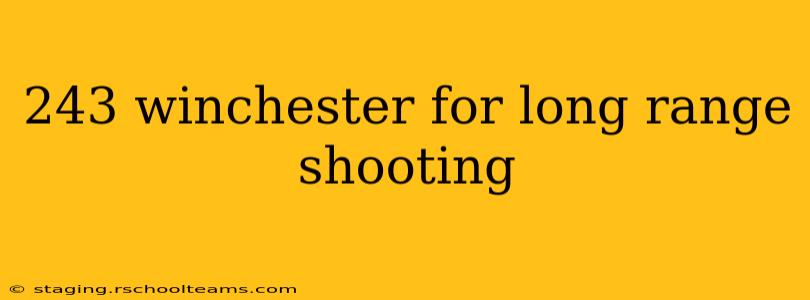The .243 Winchester, a popular cartridge known for its accuracy and mild recoil, often sparks debate regarding its suitability for long-range shooting. While not traditionally considered a magnum cartridge, advancements in bullet technology and precision rifles have significantly expanded its capabilities. This article dives deep into the .243 Win's potential for long-range accuracy, exploring its strengths, weaknesses, and considerations for those venturing beyond 300 yards.
Understanding the .243 Winchester's Ballistics
The .243 Winchester boasts a relatively flat trajectory compared to heavier calibers, making it manageable for long-range engagements. Its inherent accuracy, stemming from its design and consistent bullet performance, is a key advantage. However, its lighter bullet weight compared to cartridges like the .308 Winchester or 6.5 Creedmoor means it's more susceptible to wind drift at longer ranges.
Key Ballistic Considerations for Long Range:
-
Bullet Selection: Choosing the right bullet is paramount. Match-grade, high-ballistic coefficient (BC) bullets designed for long-range shooting are essential. Look for bullets with a BC of 0.500 or higher to minimize wind drift. Long, slender bullets like the Berger VLD Hunting or Lapua Scenar are excellent choices.
-
Twist Rate: The rifle's barrel twist rate plays a crucial role in bullet stability. A faster twist rate (1:8 or 1:9) is generally recommended for longer, heavier bullets used in long-range shooting.
-
Ammunition Quality: Consistent, high-quality ammunition is critical for accuracy at extended ranges. Handloading offers the greatest control over bullet selection and charge weight, enabling fine-tuning for optimal performance.
Advantages of the .243 Winchester for Long Range
Despite its limitations, the .243 Winchester possesses several advantages for long-range shooting, particularly for specific applications:
-
Reduced Recoil: Its manageable recoil makes it an excellent choice for less experienced shooters or those who prefer a less punishing shooting experience during extended practice sessions. This allows for more consistent follow-up shots.
-
Cost-Effectiveness: .243 Winchester ammunition is generally less expensive than many other long-range calibers, making it a more budget-friendly option for practice and hunting.
-
Flatter Trajectory (Within its Limitations): While not as flat as some magnums, the .243 Winchester offers a relatively flat trajectory for its class, making range estimations easier at moderate distances.
Disadvantages and Limitations
While the .243 Winchester can be effective at long range, it's crucial to acknowledge its limitations:
-
Wind Sensitivity: Its lighter bullets are significantly more affected by wind compared to heavier cartridges. Wind calls become more critical, and precise wind reading becomes essential for accurate shots at longer ranges (beyond 500 yards).
-
Energy Retention: At extreme ranges, the .243 Winchester loses energy faster than heavier calibers, potentially impacting terminal performance on game.
-
Limited Bullet Weight Options: Compared to heavier calibers, the .243 Winchester offers a smaller selection of heavier bullets, impacting its potential for maximum long-range performance.
.243 Winchester for Long-Range Hunting vs. Target Shooting
The suitability of the .243 Winchester depends on the application:
-
Hunting: Within its effective range (which is significantly dependent on shooter skill and environmental factors), the .243 Winchester is a viable option for hunting medium-sized game. Ethical considerations regarding shot placement and energy retention are paramount at longer distances.
-
Target Shooting: For long-range target shooting competitions within its effective range, the .243 Winchester can be very competitive, particularly for those prioritizing reduced recoil and cost-effectiveness.
Conclusion: Is the .243 Winchester Right for You?
The .243 Winchester's suitability for long-range shooting depends on your expectations, skill level, and the specific application. With careful consideration of bullet selection, rifle setup, and environmental conditions, it can deliver impressive accuracy at extended ranges. However, it’s crucial to understand its limitations regarding wind drift and energy retention compared to heavier calibers. While not ideal for extreme long-range shooting, it remains a versatile and capable cartridge for many long-range applications, especially for those prioritizing manageable recoil and cost-effectiveness. Remember to always practice safe shooting habits and prioritize ethical hunting practices.
